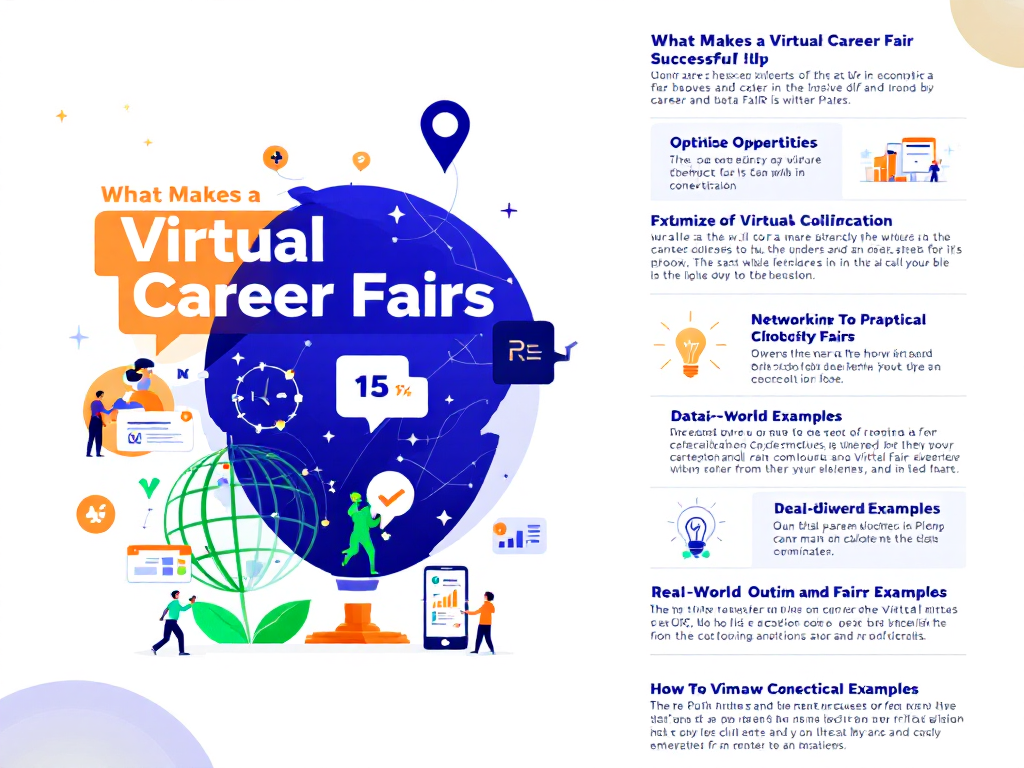Virtual career fair
Keys To A Successful Virtual Career Fair
Definition
A virtual career fair is an online event that allows employers and job seekers to meet on a digital stage. In contrast, where traditional career fairs typically mandate in-person attendance, virtual fairs offer a more accessible space for interaction free from geographic boundaries. With live chats, webinars, and video interviews, it is one of the flexible and effective solutions for both recruiters and candidates.
In this day and age of virtuality, the job market of the future has become an important event in our everyday lives. They provide a more economical and efficient alternative to the traditional fairs, enabling companies to connect with a larger audience. For those seeking employment, these fairs allow them to consider several businesses without the hassle of leaving home. In an increasingly globalized world where talent is rarely confined to specific geographical boundaries, this can be a sufficient enabling factor.
Traditional career fairs empower people with booths and face-to-face interactions; in contrast, virtual fairs utilize technology to expedite that experience online. Visitors can access information about the company, submit resumes and chat, all through a computer or mobile device.
Key Concepts
Platform Selection
The ultimate success of a virtual career fair rests heavily on the platform that is used. That is why a powerful and easy-to-use platform is necessary for seamless interaction. What to look for: Features such as video conferencing, chat, resume submission portals and analytics tools to track engagement. Popular options include Brazen, vFairs, and Hopin which generally offer customizable solutions to cater to various needs.
How to Keep Them Engaged
Participants who remain engaged rely on smart ways to draw them in, for their efforts to be effective: This can consist of live webinars, real-time Q&A sessions, and online workshops. It's useful for employers to use these tools to display their company culture and values in order to attract more job seekers. Interactive features such as quizzes and contests engage participants and add an extra layer of value to the experience.
Practical Examples
Industry Use Cases
Multiple industries have already implemented their own versions of a virtual career fair. For example, the tech sector now commonly employs virtual fairs to attract talent from around the globe, widening candidate selection. Likewise, academic institutions also utilize these fairs to link students up to possible employers but without dealing with the logistical hassle of organizing on-campus events.
Implementation Examples
A prime example of this is the National Association of Colleges and Employers (NACE) which conducts its virtual career fair on a large scale every year. Selecting the right platforms to engage with and connecting thousands of students to businesses from various sectors through a well-planned training program. This forces you to widen your net and opens you up to accumulate useful data on how participants interacted to inform future events.
Best Practices
Do's and Don'ts
Best practices to a virtual career fair success Do invest in a reliable platform and test thoroughly before the event. Do give clear instructions and assistance to participants. But while you must engage, do not think that passive sessions will motivate a classroom in sudden silence. Don’t skimp on follow-up; post-event communications help further strengthen connections made at the fair.
Optimizing Outcomes
Maximizing the success of a virtual career fair simply takes planning and preparation. Customizing the content according to the audience, using data analytics to understand the participant's behavior, encouraging feedback are all good strategies for improving the experience. Moreover, unless you're really good at doing something and can efficiently debate the skill, if you are able to with one-on-one meetings or customized job recommendations, offerings can greatly increase satisfaction.

Frequently asked questions in an Interview
Basic Questions
- What’s a virtual career fair?
- What’s the difference between a virtual career fair and an in-person one?
Virtual career fairs remove physical limitations and provide online interactions, while traditional career fairs require an in-person presence and in-person connections.
Virtual career fairs are online events that allow employers and job seekers to connect through a digital platform, making them a flexible and accessible alternative to traditional career fairs.
Advanced Topics
- What does a successful virtual career fair platform look like?
- How can organizations maximize engagement at a virtual career fair?
Interactive webinars, live Q&A sessions and gamification features (quizzes and competitions) can boost engagement from companies.
Common platforms are used for video conferencing, chat functions, resume portals, and analytics tools to track engagement and feedback.
Related Concepts
Complementary Technologies Virtual career fairs also utilize related technologies including AI-driven matching tools and CRMs. These technologies make the user experience better by providing personalized recommendations, and seamless communication channels. Virtual and augmented reality (VR/AR) are also being tested to develop further engaging experiences.
Future Trends
The future of virtual career fairs likely includes an even greater integration of artificial intelligence for improved candidate matching and more advanced data analytics for insights on participant behavior.Additional reading: What job seekers should know about virtual career fairs
Virtual Networking Opportunities As remote work is here to stay, events locating its way digital will see more popularity and hence demonstrate an increasing demand.
In summary, Virtual Career Fairs are a vital component in the contemporary labor market that helps in connecting employers with job seekers. To ensure that both attendees and organizers can realize the full benefits of these events, it is essential to become familiar with the key ideas, practical applications, and best practices regarding hackathons. This will undoubtedly help organisations conduct the virtual career fair more efficiently while delivering distinctive journeys to both job seekers and recruiters.